- Home
- Ken Follett
Paper Money Page 9
Paper Money Read online
Page 9
He turned under a railway arch into a long, curving road which had the river on its left-hand side and a scrap yard on the right. It was a mild, clear day, and so, as he followed the gentle bend, he had no difficulty in seeing the large car transporter, piled high with battered and crushed vehicles, reversing with difficulty into the scrap yard gate.
At first it looked as though the truck would be out of the way by the time the convoy reached it. But the driver obviously did not have the angle of approach quite right, for he pulled forward again, completely blocking the road.
The two motorcycles in front braked to a halt, and Ron drew the van up behind them. One cyclist heaved his machine onto its stand and jumped up on the footplate of the cab to shout at the driver. The truck's engine was revving noisily, and black smoke poured from its exhaust in clouds.
"Report an unscheduled stop," Ron said. "Let's work the routine like the book says."
Max picked up the radio microphone. "Mobile to Obadiah Control."
Ron was looking at the truck. It carried an odd assortment of vehicles. There was an elderly green van with COOPERS FAMILY BUTCHER painted on the side; a crumpled Ford Anglia with no wheels; two Volks-wagen Beetles piled one on top of the other; and, on the upper rack, a large white Australian Ford with a coachline and a new-looking Triumph. The whole thing looked a bit unsteady, especially the two Beetles in a rusty embrace, like a pair of copulating insects. Ron looked back at the cab: the motorcyclist was making signs at the driver to get out of the convoy's way.
Max repeated: "Mobile to Obadiah Control. Come in, please."
We must be quite low, Ron thought, this close to the river. Maybe reception is bad. He looked again at the cars on the transporter, and realized that they were not roped down. That really was dangerous. How far had the transporter traveled with its load of unsecured scrap?
Suddenly he understood. "Give the Mayday!" he yelled.
Max stared at him. "What?"
Something hit the roof of the van with a clang. The truck driver jumped out of his cab onto the motorcyclist. Several men in stocking masks swarmed over the scrap yard wall. Ron glanced in his wing mirror and saw the two motorcyclists behind the van being knocked from their machines.
The van lurched and then, incomprehensibly, seemed to rise in the air. Ron looked to his right and saw the arm of a crane reaching over the wall to his roof. He snatched the microphone from a bemused Max as one of the masked men ran toward the van. The man lobbed something small and black, like a cricket ball, at the windshield.
The next second passed slowly, in a series of pictures, like a film seen frame by frozen frame: a crash helmet flying through the air; a wooden club landing on someone's head; Max grabbing the gear stick as the van tilted; Ron's own thumb pressing the talk button on the microphone as he said "Obadiah Mayd--"; the small bomb that looked like a cricket ball hitting the windshield and exploding, sending toughened glass fragments into the air in a shower; and then the physical blow as the shock wave hit and the quiet darkness of unconsciousness.
Sergeant Wilkinson heard the call sign "Obadiah" from the currency shipment, but he ignored it. It had been a busy morning, with three major traffic hold-ups, a cross-London chase after a hit-and-run driver, two serious accidents, a warehouse fire, and an impromptu demonstration in Downing Street by a group of anarchists. When the call came in he was taking a cup of instant coffee and a ham roll from a young West Indian girl and saying: "What does your husband think about you coming to work with no bra?"
The girl, who had a large bust, said: "He doesn't notice," and giggled.
Constable Jones, on the other side of the console, said: "There you are, Dave, take the hint."
Wilkinson said: "What are you doing tonight?"
She laughed, knowing he was not serious. "Working," she said.
The radio said: "Mobile to Obadiah Control. Come in, please."
Wilkinson said: "Another job? What?"
"I'm a go-go dancer in a pub."
"Topless?"
"You'll have to come along and see, won't you?" the girl said, and she pushed her trolley on.
The radio said: "Mayd--" then there was a muffled bang, like a burst of static, or an explosion.
The grin faded rapidly from Wilkinson's young face. He flicked a switch and spoke into the microphone. "Obadiah Control, come in, Mobile."
There was no reply. Wilkinson called to his supervisor, putting a note of urgency into his voice. "Guvnor!"
Inspector "Harry" Harrison came across to Wilkinson's position. A tall man, he had been running his hands through his thinning hair, and now he looked more distraught than he was. He said: "Everything under control, Sergeant?"
"I think I caught a Mayday from Obadiah, guv."
Harrison snapped: "What do you mean, think?"
Wilkinson had not made sergeant by admitting his mistakes. He said: "Distorted message, sir."
Harrison picked up the mike. "Obadiah Control to Mobile, do you read? Over." He waited, then repeated the message. There was no reply. He said to Wilkinson: "A distorted message, then they go off the air. We've got to treat it as a hijack. That's all I need." He had the air of a man to whom Fate has been not merely unjust but positively vindictive.
Wilkinson said: "I didn't get a location."
They both turned to look at the giant map of London on the wall.
Wilkinson said: "They took the river route. Last time they checked in was at Aldgate. Traffic's normal, so they must be somewhere like, say, Dagenham."
"Great," Harrison said sarcastically. He thought for a moment. "Put out an all-cars alert. Then detach three from East London patrols and send them on a search. Alert Essex, and make sure those idle sods know how much bloody money is in that van. All right, on your bike."
Wilkinson began to make the calls. Harrison stood behind him for a few moments, deep in thought. "We should get a call before too long--someone must have seen it happen," he muttered. He thought a bit more. "But then, if chummy is clever enough to knock the radio out before the boys can call in, he's clever enough to do the job somewhere quiet." There was a longer pause. Finally Harrison said: "Personally, I don't think we stand a sodding chance."
It was going like a dream, Jacko thought. The currency van had been hoisted over the wall and gently set down beside the cutting gear. The four police motorcycles had been tossed aboard the transporter, which had then reversed into the yard. The riders now lay in a neat line, each of them handcuffed hand and foot, and the yard gates were shut.
Two of the boys, wearing goggles over their stocking masks, made a man-sized hole in the side of the currency van while another plain blue van was backed up. A large rectangle of steel fell away, and a uniformed guard jumped out with his hands above his head. Jesse handcuffed him and made him lie down beside the police escort.
The cutting gear was wheeled away rapidly and two more men got into the currency van and began to pass the chests out. They were put straight into the second van.
Jacko cast an eye over the prisoners. They had all been bashed about a bit, but not seriously. All were conscious. Jacko was perspiring under the mask, but he dared not take it off.
There was a shout from the cabin of the crane, where one of the boys was keeping watch. Jacko looked up. At the same time, he heard the sound of a siren.
He looked around. It couldn't be true! The whole idea was that they should knock the guards out before they had time to radio for help. He cursed. The men were looking to him for guidance.
The transporter had backed behind a pile of a tires, so the white motorcycles could not be seen. The two vans and the crane looked innocent enough. Jacko shouted: "Everybody get under cover!" Then he remembered the prisoners. No time to drag them out of the way. His eye lit upon a tarpaulin. He pulled it over the five bodies, then dived behind a skip.
The siren came nearer. The car was traveling very fast. He heard the squeal of tires as it swung under the railway arch, then the scream of the engine as the car
touched seventy in third before changing up. The sound got louder; then suddenly the pitch of the siren dropped and the noise began to recede. Jacko breathed a sigh of relief, then heard the second siren. He yelled: "Stay down!"
The second car passed, and he heard a third. There was the same squeal under the arch, the same third-gear burst after the corner--but this time the car slowed outside the gate.
Everything seemed very quiet. Jacko's face was unbearably hot under the nylon. He felt he was going to suffocate. He heard a sound like policeman's boots scraping on the gate. One of them must be climbing up to have a look over. Suddenly Jacko remembered that there were two more guards in the cab of the van. He hoped to Christ they didn't come round just now.
What was the copper up to? He hadn't climbed right over, but he hadn't fallen back, either. If they came in for a good look, it would all be up. No, don't panic, he thought, ten of us can see to a carful of wollies. But it would take time, and they might have left one in the car, who could radio for reinforcements--
Jacko could almost feel all that money slipping through his fingers. He wanted to risk a peep around the side of the skip, but he told himself there was no point: he would know when they left by the sound of the car.
What were they doing?
He looked again at the currency van. Jesus, one of the blokes was moving. Jacko hefted his shotgun. It was going to come to a fight. He whispered: "Oh, bollocks."
There was a noise from the van--a hoarse yell. Jacko scrambled to his feet and stepped around the skip with his gun ready.
There was nobody there.
Then he heard the car pull away with a screech of tires. Its siren started up again and faded into the distance.
Deaf Willie emerged from behind the rusty shell of a Mercedes taxi. Together, they went toward the van. Willie said: "Jolly good fun, ain't it?"
"Yes," Jacko said sourly. "Better than watching the bloody television." They looked inside the van. The driver was groaning, but he did not look badly hurt. "Out you come, Grandad," Jacko said through the broken window. "Tea break's over."
The voice had a calming effect on Ron Biggins. Until then he had been dazed and panicky. He did not seem to be hearing properly, there was a pain in his head, and when he put his hand up to his face he touched something sticky.
The sight of a man in a stocking mask was curiously bracing. It was all very clear. An extremely efficient raid--in fact, Ron was somewhat awed by the smoothness of the operation. They had known the route, and the timing, of the currency van's trip. He began to feel angry. No doubt a percentage of the haul would find its way into the secret bank account of a corrupt detective. Like most police and security workers, he hated bent coppers even more than villains.
The man who had called him Grandad opened the door, reaching through the shattered glass of the side window to operate the internal lock. Ron got out. The movement hurt him.
The man was young--Ron could distinguish long hair underneath the stocking. He wore jeans and carried a shotgun. He gave Ron a contemptuous push and said: "Hands out, neatly together, Pop. You can go to hospital in a minute."
The pain in Ron's head seemed to grow with his anger. He fought down an urge to kick out at something, and made himself remember how he was supposed to behave during a raid: Don't resist, cooperate with them, give them the money. We're insured for it, your own life is more valuable to us, don't be a hero.
He began to breathe hard. In his concussed mind he confused the young man holding the shotgun with the corrupt detective and with Lou Thurley, panting and groaning on top of innocent, virginal Judy, in some verminous bed at a dingy studio apartment; and suddenly he realized that it was this man who had messed up his, Ron's, life, and that maybe a hero was what he needed to be to win back the respect of his only child, and that nogoods like this corrupt detective wearing a stocking mask in bed with Judy and carrying a shotgun was the kind who always messed it up for good people like Ron Biggins; so he took two steps forward and punched the astonished young man's nose, and the man stumbled and pulled both triggers of his gun, shooting not Ron, but another masked man beside him, who screamed blood and fell down; and Ron stared, horrified, at the blood until the first man hit him over the head very hard with the metal barrel of the gun, and Ron passed out again.
Jacko knelt beside Deaf Willie and pulled the shreds of stocking away from the older man's face. Willie's face was a dreadful mess, and Jacko went pale. Jacko and his like usually inflicted wounds upon their victims and one another with blunt instruments; consequently Jacko had never seen gunshot wounds before. And since in-house training in first aid was not one of the perks in Tony Cox's management training scheme, Jacko did not really know what to do. But he was capable of quick thinking.
He looked up. The others were standing around, staring. Jacko yelled: "Get on with it, you dozy bastards!" They jumped.
He bent closer to Willie and said: "Can you hear me, mate?"
Willie's face twisted, but he was unable to speak.
Jesse knelt on Willie's other side. "We got to get him to hospital," he said.
Jacko was ahead of him. "I need a hot car," he said. He pointed to a blue Volvo parked nearby. "Whose is that?"
"It belongs to the owner of the yard," Jesse said.
"Perfect. Help me get Willie in there."
Jacko took his shoulders and Jesse his legs. They carried him to the car, whimpering, and put him on the backseat. The keys were in the ignition.
One of the men called from the currency truck: "All done, Jacko."
Jacko would have struck the man for using his name, but he was preoccupied. He said to Jesse: "Know where you're going?"
"Yes, but you're supposed to come with me."
"Never mind. I'll get Willie to hospital somehow, and meet you at the farm. Tell Tony what happened. Now, drive slow, don't shoot the lights, pull up at zebra crossings, do it like it was a bleeding driving test, okay?"
"Yes," Jesse said. He ran back to the getaway van and tested the rear doors. They were locked. He stripped the brown paper off the license plates--its purpose had been to stop the guards getting the number; Tony Cox thought of everything--and got behind the wheel.
Jacko started the Volvo. Someone opened the yard gate. The rest of the men were already getting into their own cars and peeling off their gloves and masks. Jesse pulled out in the van and turned right. Jacko followed him out and went the opposite way.
As he accelerated down the street, he glanced at his watch: ten twenty-seven. The whole thing had taken eleven minutes. Tony was right: he had said they would be away and clear in the time it takes a squad car to get from Vine Street nick to the Isle of Dogs. It had been a beautiful job, except for poor Deaf Willie. Jacko hoped he would live to spend his share.
He was approaching the hospital. He had figured out the way he would play it, but he needed Willie to be out of sight. He said: "Will? Can you get on the floor?" There was no response. Jacko glanced back. Willie's eyes were such a mess that words like
"open" and "shut" no longer applied. But the poor sod must be unconscious. Jacko reached behind and pulled the body off the seat onto the floor. It fell with a painful bump.
He steered into the hospital grounds and parked in the car park. He got out of the car and followed signs for Casualty. Just inside the entrance he found a pay phone. He opened the directory and found the number of the hospital.
He dialed, thumbed a coin into the slot, and asked for Casualty. A phone on a desk near where he stood buzzed twice, and the sister picked it up.
She said: "One moment, please," and laid the receiver on the desk. She was a plump woman in her forties wearing a crisply starched uniform and a harassed air. She wrote a few words in a book, then picked the phone up again.
"Casualty, can I help you?"
Jacko spoke quietly, watching the sister's face. "There is a man with shotgun wounds in the back of a blue Volvo car in your car park."
The portly nurse paled. "You mean he
re?"
Jacko was angry. "Yes, you dozy old cow, in your own hospital. Now get off your bum and go and get him!" He was tempted to slam the phone down, but he stopped himself and pressed the cradle instead: if he could see the sister, then she could see him. He held the dead phone to his ear while she put hers down, got to her feet, summoned a nurse, and went out into the car park.
Jacko went farther into the hospital and left by another exit. He looked across from the main gate and saw a stretcher being carried across the car park. He had done all he could for Willie.
Now he needed another car.
15
Felix Laski liked the office of Nathaniel Fett. It was a comfortable room with unobtrusive decor, a good place in which to do business. It had none of the gimmicks Laski used in his own office to give him advantage, like a desk by the window so that his own face was in shadow, or the low, unsteady visitors' chairs, or the priceless bone china coffee cups, which people were terrified of dropping. Fett's office had the atmosphere of a club for company chairmen: no doubt it was deliberate. Laski noticed two things as he shook Fett's long, narrow hand: first, that there was a large, apparently little-used desk; and second, that Fett wore a club tie. The tie was a curious choice for a Jew, he reflected; then, on second thought, he decided it was not curious at all. Fett wore it for the same reason Laski wore a beautifully tailored Savile Row pinstriped suit: as a badge which said I, too, am an Englishman. So, Laski thought, even after six generations of banking Fetts, Nathaniel is still a little insecure. It was a piece of information which could be used.
Fett said: "Sit down, Laski. Would you like coffee?"
"I drink coffee all day. It's bad for the heart. No, thank you."
"A drink?"
Laski shook his head. Refusing hospitality was one of his ways of putting a host at a disadvantage. He said: "I knew your father quite well, until he retired. His death was a loss. This is said of so many people, but in his case it is true."
"Thank you." Fett sat back in a club chair opposite Laski and crossed his legs. His eyes were inscrutable behind the thick glasses. "It was ten years ago," he added.

 The Pillars of the Earth
The Pillars of the Earth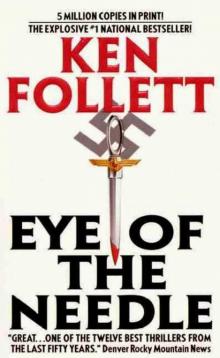 Eye Of The Needle
Eye Of The Needle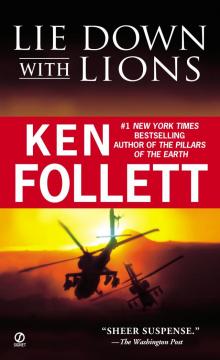 Lie Down With Lions
Lie Down With Lions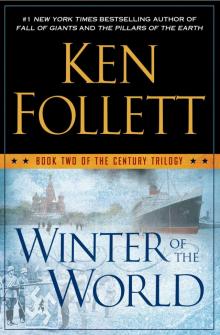 Winter of the World
Winter of the World Triple
Triple World Without End
World Without End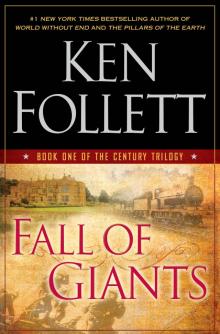 Fall of Giants
Fall of Giants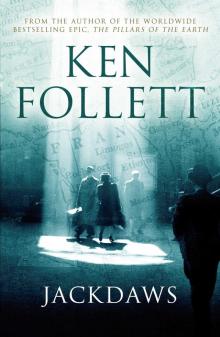 Jackdaws
Jackdaws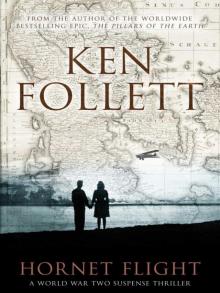 Hornet Flight
Hornet Flight Whiteout
Whiteout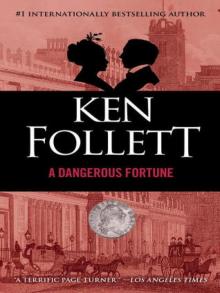 A Dangerous Fortune
A Dangerous Fortune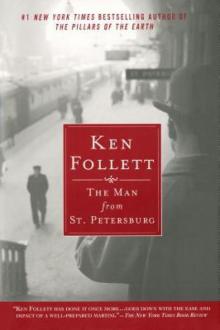 The Man From St. Petersburg
The Man From St. Petersburg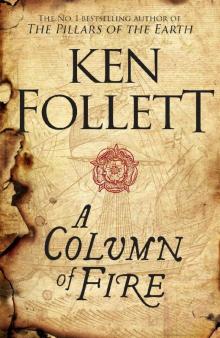 A Column of Fire
A Column of Fire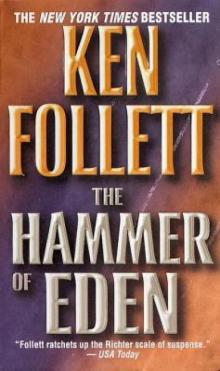 The Hammer of Eden
The Hammer of Eden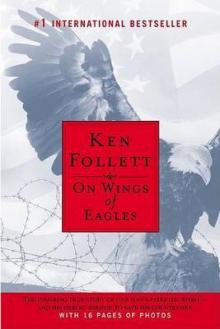 On Wings of Eagles
On Wings of Eagles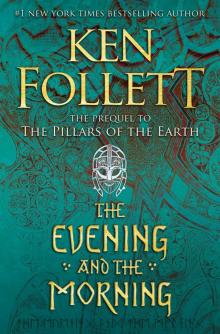 The Evening and the Morning
The Evening and the Morning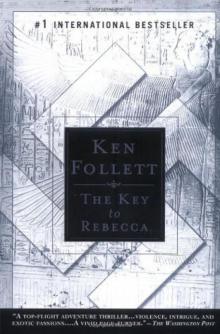 The Key to Rebecca
The Key to Rebecca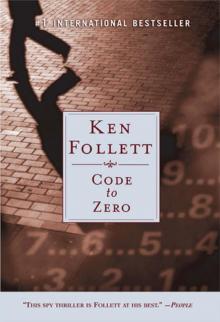 Code to Zero
Code to Zero Paper Money
Paper Money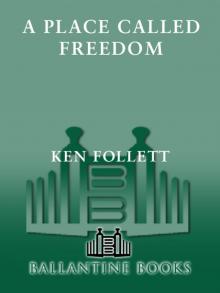 A Place Called Freedom
A Place Called Freedom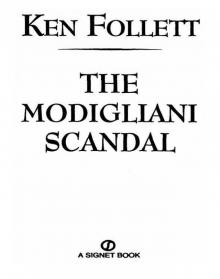 The Modigliani Scandal
The Modigliani Scandal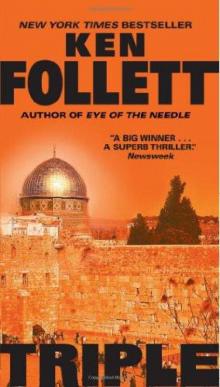 Triple (1991)
Triple (1991)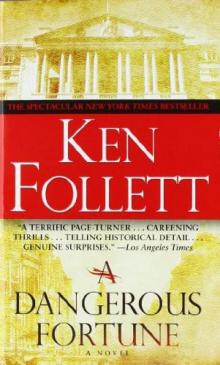 A Dangerous Fortune (1994)
A Dangerous Fortune (1994)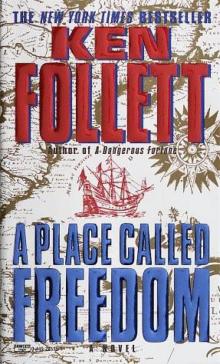 A Place Called Freedom (1995)
A Place Called Freedom (1995)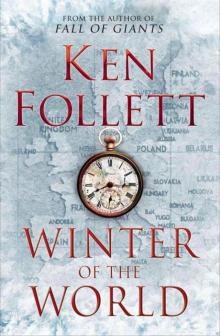 Winter of the World (Century Trilogy 2)
Winter of the World (Century Trilogy 2)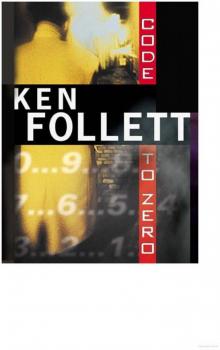 Code to Zero (2000)
Code to Zero (2000)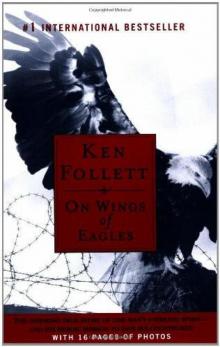 On Wings Of Eagles (1990)
On Wings Of Eagles (1990)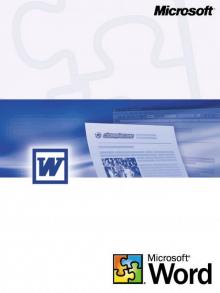 Storm Island
Storm Island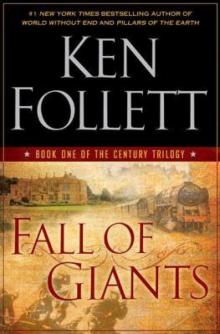 Fall of Giants (The Century Trilogy)
Fall of Giants (The Century Trilogy)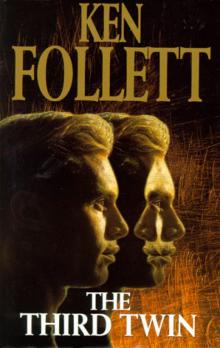 the Third Twin (1996)
the Third Twin (1996)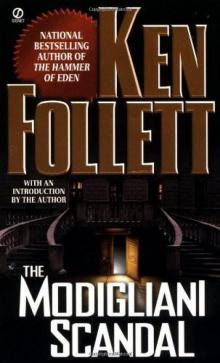 The Modigliani Scandal (1976)
The Modigliani Scandal (1976)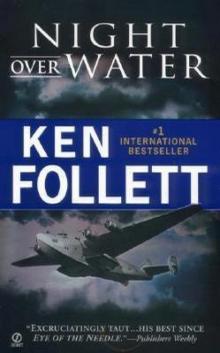 Night Over Water
Night Over Water